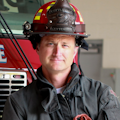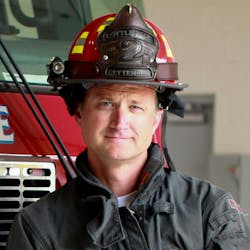I am an engine company captain who still uses a pen and paper to take notes and never has taken a ride share, so technology isn’t really my thing. And, yes, the FireFusion conference is based on technology, so the conference was outside of my typical comfort zone. That said, the inaugural conference in 2024 pushed me further to understand technology in the fire service, and the people who could answer my questions were right there with me in Charleston, SC.
Furthermore, I wholeheartedly believe that there were learning opportunities for all members of the fire service. We must look outside of our typical bubble to grow.
The venue
Charleston is a beautiful, historic city that’s recognized as a must-visit in many travel surveys.
Before the conference started, I spent the weekend touring the city for the history and southern lifestyle.
The Charleston Gaillard Center is beautiful. It isn’t often that you can observe a fire service presentation from the balcony of a performance theater.
The conference provided breakfast, snacks and lunch. The meals were well beyond the typical continental breakfast and boxed lunches. The conference organizers provided time and a space to network with other attendees and vendors. Of course, there’s a lot that can be learned during such informal gatherings.
Top 5 Takeaways
FireFusion’s fresh approach to a fire service conference is worth checking out. Although below I list a handful of takeaways, I benefited in many more ways.
1. Learning from the tragedy of 2007. Three presentations addressed various aspects of the Charleston Fire Department (CFD) prior to the 2007 Sofa Super Store Fire and the organizational growth post-incident. One of the greatest opportunities for me was a tour of the site, which now serves as a memorial to the firefighters who lost their life. Dr. David Griffin, who is the assistant chief of administration for the CFD and was the driver of the first-due engine that responded to the fire, teamed with Battalion Chief TJ Axson, who was the backstep firefighter that day, to lead the tour participants. First-hand accounts of what transpired on scene were absolutely incredible.
2. Using a regular navigation app to gather information on the location of a motor vehicle accident. Real-time data, which are confirmed by drivers who are in the area, often can lead to a more accurate location compared with that which is supplied by a 9-1-1 caller.
3. Time to evolve. Retired FDNY Deputy Assistant Chief Frank Leeb asked the very thought-provoking question of the audience, “Would you allow a doctor to perform surgery on you with 1999 technology?” Yes, members of the fire service rightfully pride themselves on their undertaking of a dangerous, gritty, blue-collar job that’s rooted in tradition. I don’t advocate getting away from the tradition, but for the sake of our customers, it’s time that our business evolves. Leeb supported this notion when he cited several businesses that didn’t evolve and, ultimately, failed.
4. Failure of technology? What is thought of as a failure of technology can be, in fact, us holding fast to a belief that our job on the fireground is very manual. Andy Starnes pointed out that “white out” of thermal imaging cameras (TIC) no longer is a thing. White out often is a result of condensation on the lens and the screen of the device. Wipe your facepiece, wipe the lens and screen of the TIC and use your nondominant hand to do both. The TIC is a tool to gather information but should be part of a multi-input decision-making process, including your eyes, ears and intuition. Our training on this tool must include much more than point and look.
5. The conference flow was very blended. This kept my interest. Four tailboard talks (15-minute presentations after lunch) were a great way to get short nuggets of information and keep moving.
Think tanks allowed for people to attend sessions based on a particular area of interest and engage a panel with questions that might be challenging their organization.
Networking opportunities were focused around food. Of course, firefighters love sitting around a table and talking, and given that the meals went beyond the typical conference fare, many attendees stayed after they were done eating. A lot can be learned during such informal gathering opportunities.
FireFusion 2025
FireFusion returns to the Charleston Gaillard Center, Oct. 14–16, 2025.
The design of the event encompasses two keynote addresses; interactive classroom sessions; short, high-paced Tailboard Talks; and group discussions in the form of Think Tanks, where moderators will engage attendees.
Attendees will have the opportunity to have a guided tour of the site of the 2007 Charleston Sofa Super Store Fire, which claimed the life of nine firefighters.
Walking leadership tours that will be led by Charleston Fire Department chiefs and officers will provide the opportunity to learn about fire service leadership while exploring the history of the department.
A new opportunity this year is a session at The Citadel, The Military College of South Carolina. Attendees will learn about military leadership and how the region is built on those principles.
Additional off-site sessions will be offered to help firefighters to learn about continually improving technology in response roles.
This year’s conference sessions will include presentations on drones for fire/rescue operations and artificial intelligence and how it’s being used by departments for everything from reports and preplans to training and wildfire notifications.
Interactive sessions that will employ incident command software and mobile technology will help attendees not only to understand how to implement such programs but how to command fireground operations, from dispatch until the incidents are under control.
Helping firefighters to track their own health and wellness plus have critical resources at their fingertips will be an area of focus that will allow chiefs/officers to take care of their colleagues, from physical to mental health.
At the Technology Showcase, attendees will be able to meet face to face with service and equipment providers that are using technology and high-tech equipment. Company representatives will help departments to implement technology for use in their organization.
Reserve your spot today! Last year’s conference sold out. You can take advantage of early bird pricing as well as group registration discounts at firefusionconference.com.
About the Author

Brian Gettemeier
Brian S. Gettemeier has been in the fire service for 31 years, the past 28 years as a career firefighter with the Cottleville Fire Protection District of St. Charles County, MO, where he serves as an engine company captain. He is a member of St. Louis Metro Urban Search and Rescue Task Force 1. Gettemeier is a second-generation firefighter. He has a bachelor’s degree in fire service management from Southern Illinois University and holds numerous state certifications. Gettemeier teaches all-hazard classes for numerous municipal and industrial organizations throughout the states of Missouri and Illinois. He presented at Firehouse Expo multiple times.
